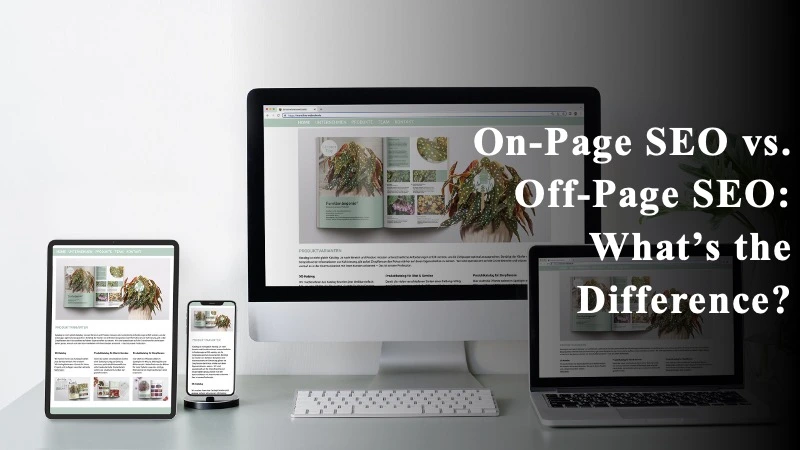
In the world of digital marketing, Search Engine Optimization (SEO) is critical for increasing website visibility and driving traffic. However, SEO is not a one-size-fits-all strategy. It can be broadly divided into two main categories: On-Page SEO and Off-Page SEO. Understanding the distinction between these two types is essential for creating a balanced and effective SEO strategy.
What Is On-Page SEO?
On-Page SEO refers to the optimization of elements within your website to improve its visibility and rankings on search engine results pages (SERPs). These are factors that you can control directly and include content, structure, and design elements.
Key Components of On-Page SEO:
- Content Quality and Relevance
- Creating high-quality, engaging, and relevant content is the cornerstone of On-Page SEO. Use targeted keywords naturally and ensure the content meets user intent.
- Incorporate multimedia like images, videos, and infographics to enhance user engagement.
- Keyword Optimization
- Conduct keyword research to identify relevant terms and phrases your audience searches for.
- Optimize title tags, meta descriptions, headers, and body content with these keywords.
- URL Structure
- Use short, descriptive, and keyword-rich URLs that are easy for users and search engines to understand.
- Title Tags and Meta Descriptions
- Craft compelling title tags and meta descriptions that include primary keywords and entice users to click.
- Internal Linking
- Link to relevant pages within your website to improve navigation, reduce bounce rates, and help search engines crawl your site more effectively.
- Mobile-Friendliness
- Ensure your website is responsive and works seamlessly across all devices, particularly mobile, as search engines prioritize mobile-first indexing.
- Page Speed
- Optimize loading times by compressing images, enabling browser caching, and reducing unnecessary scripts.
- User Experience (UX)
- A well-structured, visually appealing website with intuitive navigation is crucial for retaining visitors.
Off-Page SEO involves strategies and activities performed outside your website to improve its authority, reputation, and overall visibility. The primary goal of Off-Page SEO is to establish your website as trustworthy and authoritative in your industry.
Key Components of Off-Page SEO:
- Link Building
- Acquiring high-quality backlinks from reputable websites is one of the most important aspects of Off-Page SEO. Backlinks signal to search engines that your content is valuable and credible.
- Use strategies like guest blogging, broken link building, and creating shareable content to earn backlinks naturally.
- Social Media Marketing
- While social media signals don’t directly impact rankings, a strong social media presence can drive traffic to your website, improve brand awareness, and increase engagement.
- Brand Mentions
- Even unlinked brand mentions can contribute to Off-Page SEO by building trust and demonstrating authority.
- Influencer Outreach
- Collaborate with influencers or industry leaders to promote your content and attract a wider audience.
- Online Reviews and Reputation Management
- Positive reviews on platforms like Google My Business, Yelp, and Trustpilot can enhance credibility and improve local search rankings.
- Content Marketing and PR
- Publish and promote valuable content across external platforms, such as industry blogs, news outlets, or forums.
| Aspect | On-Page SEO | Off-Page SEO |
| Focus | Internal website elements | External factors influencing website authority |
| Control | Full control | Limited control, relies on third parties |
| Primary Goal | Improve user experience and site structure | Enhance authority and credibility |
| Examples | Content, keywords, internal links, UX | Backlinks, social signals, brand mentions |
| Time to See Results | Relatively faster | Longer-term process |
A successful SEO strategy balances both On-Page and Off-Page SEO. While On-Page SEO ensures your website is optimized for search engines and users, Off-Page SEO helps establish authority and trustworthiness. Focusing on one without the other could limit your potential to rank highly and sustainably.
How to Balance On-Page and Off-Page SEO
- Start with On-Page SEO: Ensure your website is fully optimized before pursuing Off-Page efforts. High-quality content and a user-friendly experience will make your site more appealing to visitors and link-worthy for other websites.
- Prioritize Quality Over Quantity in Off-Page SEO: Focus on building relationships with authoritative sites rather than acquiring numerous low-quality backlinks.
- Monitor and Adjust: Use analytics tools to track the effectiveness of your efforts and adjust your strategy based on performance data.
Both On-Page SEO and Off-Page SEO play indispensable roles in driving traffic and improving rankings. On-Page SEO focuses on the elements you can control directly within your website, ensuring it is optimized for search engines and user experience. Meanwhile, Off-Page SEO builds your site's authority and reputation through external signals. By understanding the differences and integrating both strategies effectively, you can create a comprehensive SEO plan that delivers sustainable results.
